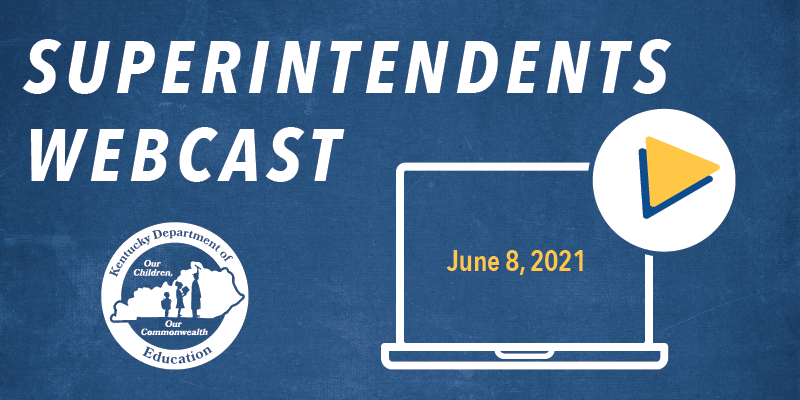 The Kentucky Department of Education (KDE) should soon receive the final third of nearly $2 billion allocated to the state under the most recent round of American Rescue Plan (ARP) Elementary and Secondary School Emergency Relief (ESSER) funding, superintendents were told during the June 8 Special Superintendents’ Webcast.
The Kentucky Department of Education (KDE) should soon receive the final third of nearly $2 billion allocated to the state under the most recent round of American Rescue Plan (ARP) Elementary and Secondary School Emergency Relief (ESSER) funding, superintendents were told during the June 8 Special Superintendents’ Webcast.
Kelly Foster, KDE associate commissioner in the Office of Continuous Improvement and Support, said that for local school districts to receive their shares of that funding, they must submit two plans:
- An ARP ESSER plan, posted on the school district’s website by July 31, showing how funds will be used to satisfy requirements and meet specific goals; and
- A Safe Return to In-Person Instruction and Continuity of Services plan, which also must be posted on the district’s website by July 31, but may be a revised version of the existing reopening plan.
Both plans must allow for “meaningful consultation” with stakeholders, Foster said. Additionally, districts must submit budgets and assurances to KDE by July 31.
A webinar for superintendents on Evidence-based Practices Under ESSA will take place on June 14 at 2 p.m. ET, she said. It will be recorded to allow for later viewing.
The U.S. Department of Education has provided guidance on the use of ESSER funds and a list of ARP ESSER resources, said Robin Kinney, KDE associate commissioner in the Office of Finance and Operations.
Equity Presentation
Three members of the Commissioner’s Student Advisory Council – Caleb Bates (Breathitt County), Anastasia Panaretos (Oldham County) and Anna Williams (Anderson County) – showed a video council members made discussing what equity means to them. It is part of a continuing project on equity and inclusion led by KDE Deputy Commissioner and Chief Equity Officer Thomas Woods-Tucker.
Following the video, Commissioner of Education Jason E. Glass commented on two pieces of legislation pre-filed in the Kentucky General Assembly opposing equity education efforts. The equity project does not undermine the value of hard work and merit, but asks school district leaders to consider the different backgrounds and needs of individual students, he said.
In focusing on equity, KDE is trying to fulfill one of the purposes of public education: creating active, able participants in representative democracy, Glass said. To that end, Kentucky has a long tradition of local control over curriculum, which the proposed legislation would damage, he said.
“It’s a terrible state-level overreach and micromanagement of our classroom teachers,” Glass said.
COVID-19 Update
More than 2 million Kentuckians out of 4.5 million have been vaccinated against COVID-19, said Dr. Connie White, deputy commissioner of the Kentucky Department for Public Health. Officials are pleased with that and the drop in cases, she said.
Guidance on planning for the fall semester should be coming soon from the U.S. Centers for Disease Control and Prevention (CDC), White said.
Kentucky has received a large CDC grant for COVID-19 testing of K-12 students, she said. A testing provider is being sought, and once one is selected, they will work with individual school districts.
Testing will be offered at no cost and with no reporting requirements for the schools, White said. Schools will only need to provide space for the testing and advertise its availability, she said.
Supplemental School Year Program
The deadline for districts to submit assurances through GMAP for participation in the Supplemental School Year Program, as allowed by Senate Bill 128, is June 16, said KDE Director of Education Policy Meredith Brewer.
“Regardless of whether or not your district plans to participate, you need to complete this form,” she said.
Students in the supplemental school year program should not be considered or marked as retained from the previous year, Brewer said. A separate process will be set up for them through Infinite Campus, she said.




Leave A Comment